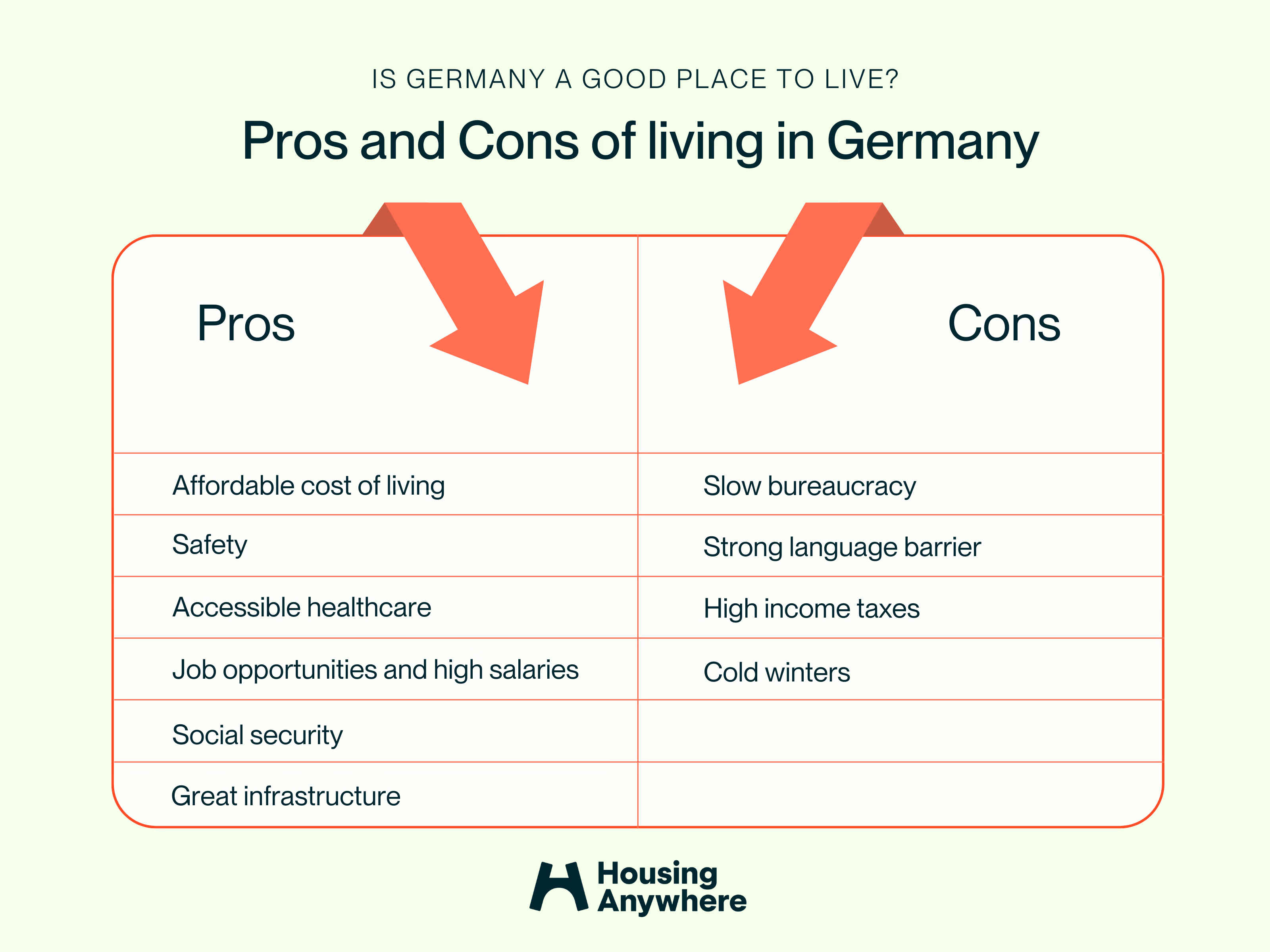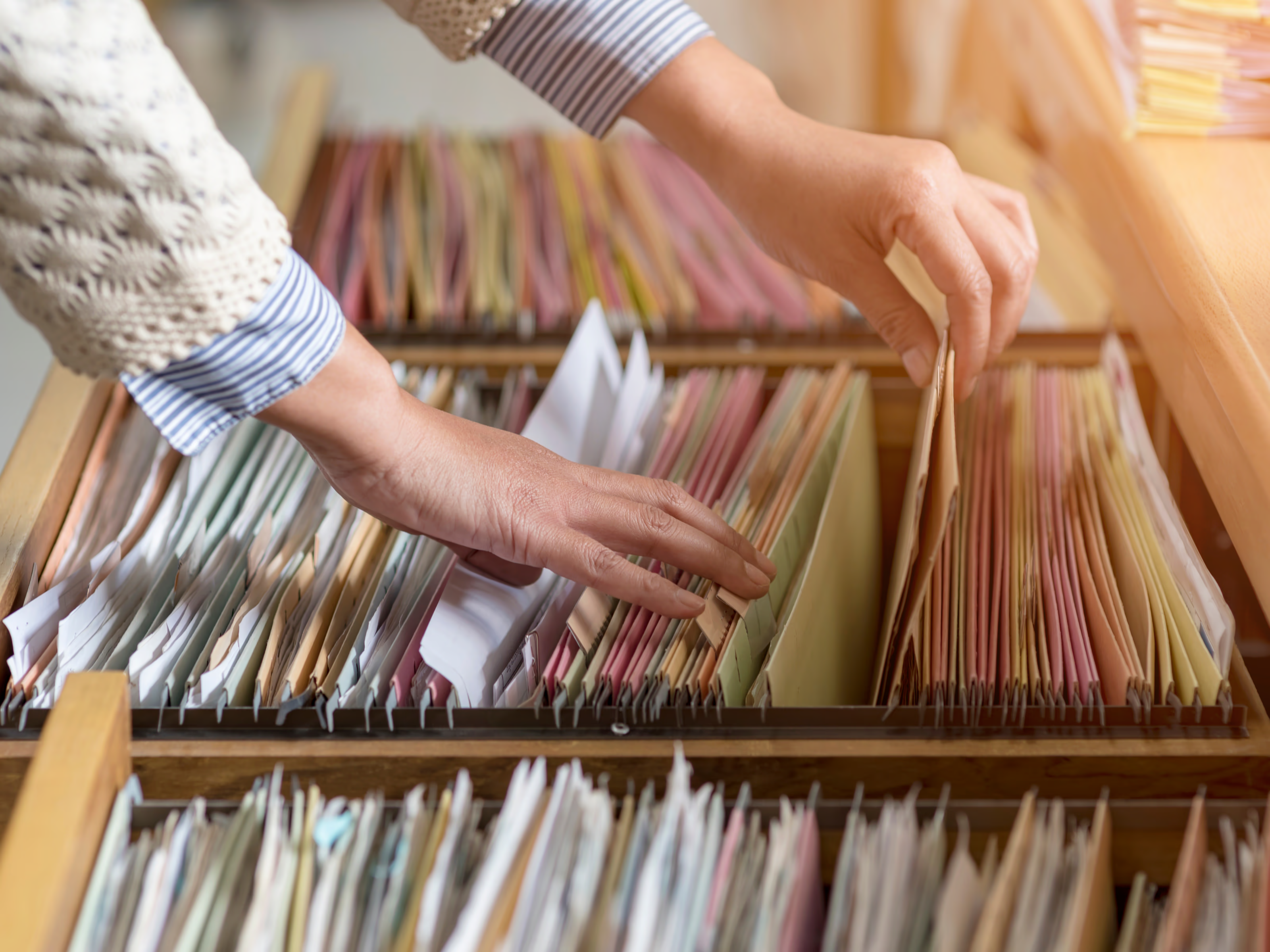10 pros and cons of living in Germany
Discover the pros and cons of living in Germany: from affordable cost of living and high salaries to slow bureaucracy and high taxes.
Ivandzhelin
Is Germany a good place to live? If you’re planning on living in Germany, you’re probably wondering what are the pros and cons of choosing it as your new home. From a high quality of life and a robust job market to a strong language barrier and slow bureaucracy, there are some of the things you’ll need to consider before living in Germany. To make your decision easier, we’ve drawn a list of the 10 pros and cons of living in Germany.

Benefits of living in Germany
Aside from the obvious, like job opportunities for expats and accessible healthcare, there are plenty of other reasons to live in Germany as a foreigner. Let’s look at the 6 key benefits of living in Germany:
- Affordable cost of living
- Safety
- Accessible healthcare
- Job opportunities and high salaries
- Social security
- Great infrastructure
1. Germany has an affordable cost of living
With an average cost of living is €1,904 monthly for a single person, Germany is one of the cheapest Western European countries to live in. The county has a lower cost of living in comparison to France, the Netherlands, and Belgium. Expenses like rent, groceries, public transport and healthcare are cheaper in Germany than in other Western European countries.
If you’re moving to Germany with your family, your monthly expenses will be higher at around €4,289 as you’ll need to budget additional expenses like childcare. Whereas, students in Germany can expect to spend around €1,226 monthly to cover their living expenses. Since education in Germany is accessible and there’re several student benefits like the Semesterticket, studying in Germany is affordable.
These costs also depend on your lifestyle and which city you’ll be living in. So if you're searching for apartments in Munich, Frankfurt and Hamburg you'll have higher living costs than if you're exploring homes for rent in Berlin, Stuttgart and Dusseldorf.
2. Germany is a safe country
Germany is generally considered a safe country, with low crime rates compared to other European countries. Germany has a safety index of 60, making it safer than the UK, France and Italy. Most cities in Germany, including metropolitan areas like Berlin, Munich, and Hamburg, have well-lit streets, reliable public transport, and visible police presence, increasing the overall feeling of safety. While petty crime, such as pickpocketing, can occur in touristy areas, Germany remains one of the safest countries in Europe.
3. Germany has accessible healthcare

Health insurance is mandatory for those living in Germany, which is why your employer enrolls you in public health insurance when you begin working. Without health insurance in Germany, non-emergency services like GP visits are paid in full by you. The cost of public health insurance is 14.6% of your gross monthly income, so it varies depending on your salary. Luckily, your employer covers half of it, making healthcare accessible regardless of your income. If you need extra care, you can even add supplementary private health insurance, which gives you access to additional services.
International students in Germany can access healthcare either through their domestic provider or by signing up for public healthcare. Students coming from non-EU countries can sign up for public health insurance (Krankenversicherung für Studenten) which costs between €120 and €235 depending on your age. Whereas, EU students can use their EHIC card for health insurance in Germany, provided they aren’t working during their studies.
4. Germany has many job opportunities and high salaries
Germany is one of the countries in Europe with the most robust job market. As it is the home of multinational companies like BMW, Siemens, Mercedes-Benz, Loewe, Allianz, BASF, and Adidas there is a high demand for international talent. However, the job market has become more challenging in recent years. The unemployment rate for international workers has risen to 15.73%, and the overall unemployment rate in Germany has also increased from 5.7% in 2023 to 6.4 % in 2025. One of the biggest obstacles for international job seekers is the language barrier. Speaking German can make a significant difference and greatly improve your chances of finding a job in Germany.
The strong job market in Germany also brings high salaries. The gross average salary in Germany is €50,244 per year which will allow you to live comfortably, considering the average expenses. Germany also compares well to its neighbors, where the average salary is around €44,000 in the Netherlands, €45,984 in Belgium, and €52,665 in Austria annually.
5. Germany has a strong social security
Germany’s social security system is one of the biggest benefits of living in Germany. As a resident of Germany, you’re provided with support in several key areas of your life like retirement, parental and sick leaves. The pension system in Germany, funded by both employees and employers, ensures that workers can enjoy financial stability in retirement. If you find yourself unemployed, Germany’s unemployment benefits provide a safety net, offering income support while you search for your next opportunity.
When it comes to health, you’ve access not only to public healthcare but also sick pay, which allows you not to worry about losing income if illness forces you to take time off or are in need of medical treatment. On top of that, living in Germany guarantees at least 20 paid vacation days per year.
This strong foundation also allows for a better work-life balance as you don’t have to work overtime to be able to access such services or have to compromise your overall quality of life to afford the cost of living.
6. Germany has great infrastructure
Germany has a highly efficient infrastructure, especially in several key areas like transport, energy, healthcare and water supply. Germany is known for its Autobahnen (highways) which cover most of the country and are among the most advanced and well-maintained road systems in the world. You can also rely on an extensive public transport network with high-speed railways connecting cities and metros, buses and trams for inner city travel.
The country is also transitioning toward renewable energy, with a strong focus on wind and solar power, while modernizing its power grid for sustainability. Water supply and waste management systems are equally advanced, providing clean drinking water nationwide and leading global efforts in recycling and waste-to-energy initiatives.
Disadvantages of living in Germany
On the other hand, what are the cons of living in Germany? As with any other country, Germany has some aspects that make it a less than ideal place to live, like the slow bureaucracy and high language barrier. Let’s unpack the 4 disadvantages of living in Germany.
- Slow bureaucracy
- Strong language barrier
- High income taxes
- Cold winters
1. Germany has a slow bureaucracy

The biggest con of living in Germany is the slow bureaucracy. While the country is known for efficiency in many areas, dealing with official paperwork can be time-consuming and complex. Whether you’re registering your address, applying for a visa, or dealing with tax offices, the process often involves long waits, multiple forms, and several in-person appointments.
Additionally, many government offices still rely on paper documents rather than digital systems, further slowing down processes. This can be particularly challenging for expats, as many forms and procedures are conducted only in German, requiring extra effort to navigate. While the system is thorough and well-regulated, the slow pace can feel like a hurdle when you’re trying to settle in or handle administrative tasks.
2. Germany has a strong language barrier
The second largest challenge of living in Germany as a foreigner is the strong language barrier. While English is widely spoken in big cities and among younger generations, many aspects of everyday life, such as dealing with government offices, understanding official documents, or navigating healthcare, are conducted primarily in German.
Speaking the language also opens up more job opportunities and makes it possible to study at affordable public universities, where most programs are offered only in German. Even everyday tasks like reading bills, using public transport or grocery shopping at German supermarkets can be tricky without some German, so learning the language before you move can make a big difference.
3. Germany has high income taxes
The German tax system is progressive, meaning the more you earn, the higher the percentage of taxes you pay. Income tax rates range from 0% to 45%, with an additional “solidarity surcharge” (Solidaritätszuschlag) of 5.5% on income tax for higher earners. On top of that, employees and employers contribute to social security, which includes pension, health insurance, unemployment insurance, and long-term care insurance, amounting to around 20% of your salary.
4. Germany has cold winters
Winters in Germany can be very cold and snowy, which can be a big con of living there, especially if you aren’t used to such weather. This can be a big disadvantage of living in Germany since the temperatures get below zero for several months and life can become more difficult during the winter. On the bright side, spring and summer are beautiful in Germany, and you can get used to the weather pretty quickly.
Is Germany a good place to live?
Yes, Germany is a good place to live. The country offers a very stable environment to its residents through accessible healthcare, social benefits, an affordable cost of living, and proportionate salaries to living expenses. While Germany’s disadvantages can make your life slightly more difficult because of the slow bureaucratic processes, the country still offers an excellent quality of life. If you're planning your move, the first step is finding the right place to live. Start exploring rental homes across Germany and find your new home today.
Want to know more about Moving to Germany? Download the free e-book by filling out the form below.
This article is for informational purposes only.
Please reach out to content @housinganywhere.com if you have any suggestions or questions about the content on this page. For legal advice or help with specific situations, we recommend you contact the appropriate authorities.
Related articles
In this article
Moving to Germany?
Find accommodation in cities across Germany. Book the place of your dreams from verified landlords even before relocating!
Start my Search

